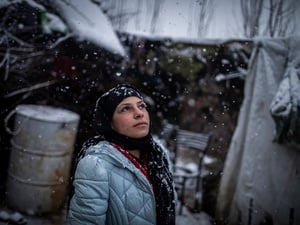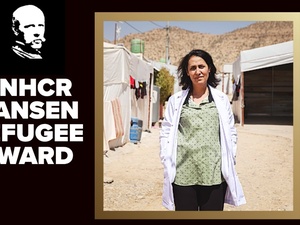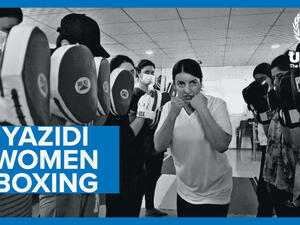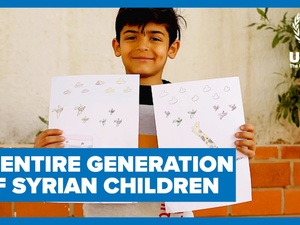Iraqi election enthusiasm reflected among refugee diaspora
Iraqi election enthusiasm reflected among refugee diaspora

Many Iraqi refugees living overeseas – like this man seen working for a recycling company in Florida – were keen to vote in the Iraqi elections.
GENEVA, December 16 (UNHCR) - As up to 11 million of the 15 million registered voters in Iraq went to the polls yesterday to choose their new parliament, many other Iraqis around the world were also given the opportunity to cast their votes and have a say in their country's future.
From 13 to 15 December, the Independent Electoral Commission of Iraq ran voting facilities for the Iraqi elections in 15 countries around the world. As a string of interviews carried out by UNHCR staff in three of those countries show, even Iraqi refugees who still do not feel secure enough to go home were on the whole keen to vote - a reflection of the mood inside Iraq where, according to preliminary estimates, the turnout was around 70 percent.
"I wanted to vote, and did - as I think there are some good candidates this year. Last year I refused to vote," said Muhsen, an Iraqi Shia and former member of the Ba'ath Party, who fled Iraq in 2003. "Even though I am outside, I still want to have a say. I think the elections in Iraq this year are democratic without any pressure from outside.... I just hope the results won't be manipulated."
Muhsen is one of the 22,280 Iraqi refugees registered by the UN refugee agency's office in the Syrian capital, Damascus. He said he decided to leave Iraq with his wife and six children in September 2003, after he was fired from his job for political reasons.
"When I started to get targeted, and my house was attacked, I thought it was time to leave," Muhsen said. "For now, I have to stay in Syria, as the security situation in Iraq is so volatile, and I fear being detained or worse when I go back." Nevertheless, he said, taking part in the elections made him feel as though he was still connected to his home country.
Samira, also an Iraqi Shia, escaped to Syria 12 years ago, during Saddam Hussein's time. However, none of her family returned to Iraq after the fall of Saddam's regime, because of the insecurity that has enveloped many parts of the country. Samira insists that Syria is much safer.
"I am voting today, as I feel it is my religious responsibility," Samira said, as she waited to cast her ballot. "My religious leader has encouraged me to vote, but has not recommended any particular candidates to me. I am not sure that the election will change anything, but I hope it does."
Over the past years, Samira's view of Iraq has become "dark," she says. "I do not think the Iraqis in power work for the sake of the country, but are instead running after their personal interests," she said. "But I believe that Iraq will be a good country when everyone will be able to enjoy his or her rights without nepotism," she added.
After the ousting of Saddam Hussein's government in 2003, many Iraqis who had lived abroad for a long time because of the repression and persecution taking place at home, returned to Iraq, celebrating the start of a new era. Some 20,500 refugees returned from Iran and Saudi Arabia with the support of UNHCR. Parallel to the organized return movements, the Iraqi Ministry of Trade recorded the spontaneous return of some 270,000 refugees to Iraq after May 2003. The vast majority of returns were to the Southern Governorates of Iraq.
At the same time, however, other Iraqis began to leave the country as the security situation worsened, and many Iraqis already abroad decided to wait and see how things developed before returning home. UNHCR estimates that nearly one million Iraqis (of whom some 98,000 are registered refugees) are living in the countries immediately surrounding Iraq, and a further 350,000 Iraqis (of whom 166,000 are registered refugees) are living further afield.
In 1982, Safa Alkateb was given 45 minutes to pack up his clothes and leave Iraq with his parents and four brothers and sisters. He was one of more than 300,000 Iraqis who were forced out of the country during the Iran-Iraq war because of their Iranian lineage, despite having lived in Iraq for generations. Safa moved to the US, where he has been ever since.
"People have travelled from as far away as Maine, Boston, and North Carolina to vote.... This is a very important election," Safa said, adding that, in some families, three or four generations of Iraqis were casting their ballots. "We feel the political process will bring the country together. You need a framework. There is no alternative but the political process, the democratic process."
Ahlam Shabak Shaker and her fifteen-year-old child have lived in the Jordanian capital, Amman, for the past two years alongside some 250,000 other Iraqis (16,376 of whom are registered as refugees). She left Iraq when her husband was abducted, apparently because he was a member of a particular political party. She has had no news of him since.
"I cannot return now, but I am voting because I hope that Iraq will return as it was before: stable and secure," she said. "But I really hope to go back to Iraq - no one likes to stay away from his or her country."
In Thursday's election, Iraqis were choosing between 7,655 candidates who were competing for 275 parliamentary seats. The elections for the new parliament mark another step forward in the democratization process, after the transfer of sovereignty, the selection of an interim parliament last January and the ratification of the constitution in October. The new parliament will name a government, including a new prime minister.
"My voting comes in anticipation that Iraq will regain its prosperity, stability and authenticity," said Ahlam from her temporary base in Amman. "Then I will go home."
UNHCR still believes that conditions inside Iraq are not conducive to the return of Iraqi refugees and is therefore not actively encouraging refugees to return. Earlier this year, the UN refugee agency noted that, despite the January 2005 elections in Iraq, the authorities were not yet able to protect citizens from violent attacks, including those specifically targeting civilians in southern and central Iraq. It also said the basic services needed for a secure and stable existence could not be guaranteed, and that premature returns could worsen tensions between residents and returnees, thereby adding to the problems.
Since 2003, UNHCR has been facilitating the return of those refugees who have approached the agency and clearly expressed their wish to go home despite the conditions.








